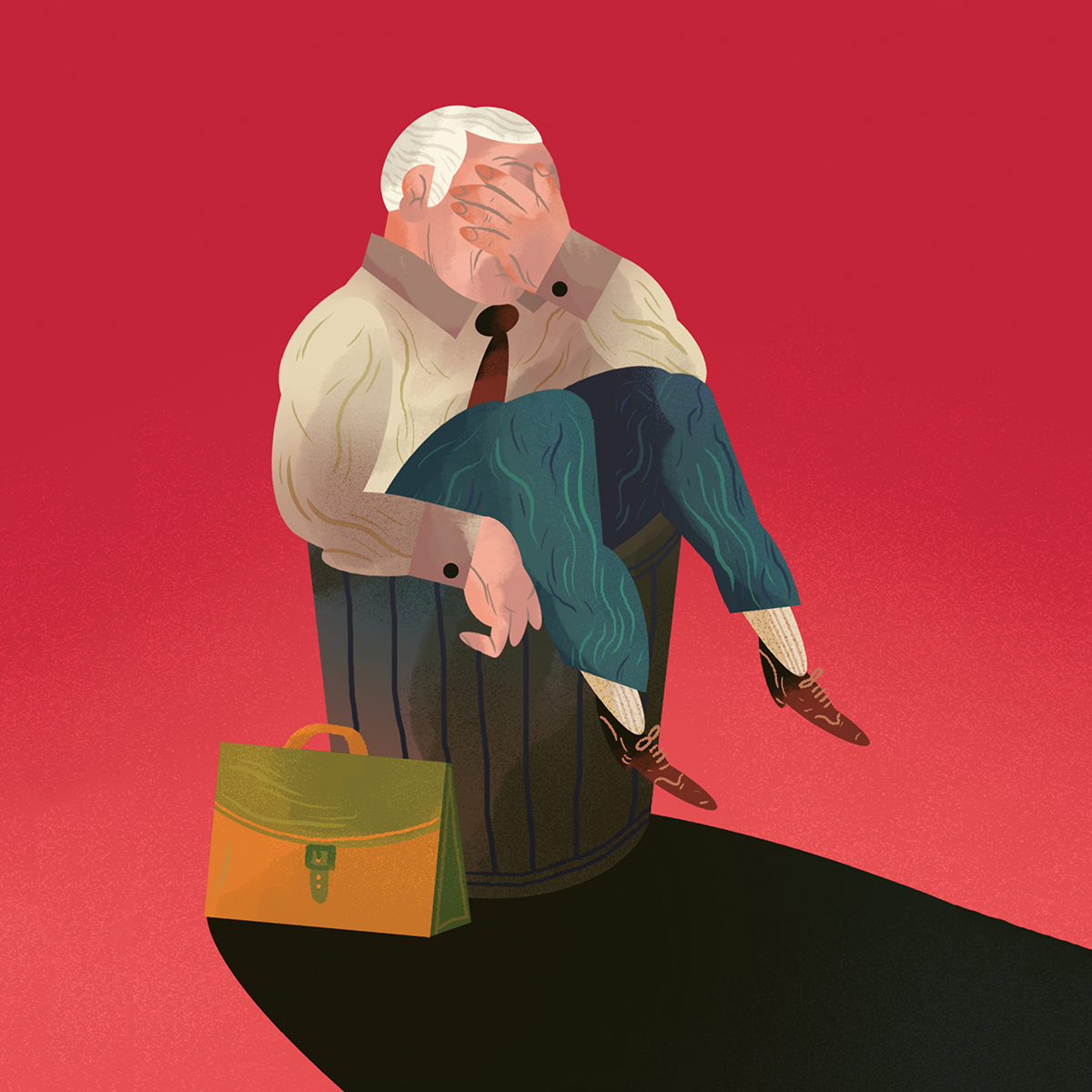Ageism in Tech Takes a Turn for the Wiser

Illustration by Scott Balmer
I’m going to turn 56 years old this summer. In most of the world that makes me middle-aged, but in the technology industry, and especially at startups, it makes me downright ancient—the human equivalent of papyrus scrolls or giant redwood trees.
I found this out the hard way. At age 52, I went to work in the marketing department of HubSpot, a software company in Cambridge, only to discover that my hiring had been something of a fluke, and that among the 500-plus-person workforce there were only a handful of people who were even close to my age. Almost everyone seemed to be right out of college. People would see me and do a double take, or leap back as if I were Beetlejuice coming around the corner with a cup of coffee in my hand. Some would ask if I needed directions, as if maybe I were lost and had wandered into their company by accident. I’d show them my ID bracelet and assure them that I was indeed one of their colleagues.
This experience shook me up so much that after leaving the company I wrote a book, Disrupted: My Misadventure in the Start-Up Bubble, which was published in April. Since then my inbox has been filling up with letters from people who have gone through something similar. They got fired at 50, or even 40, and can’t find work, they say, just because of their age. I came to realize that unfortunately my experience was common, and that bias, including bias about age, has become rampant in the tech industry. Again and again I hear the story of the gray-haired job applicant who makes it through a phone-screening process based on his or her qualifications, then shows up for the in-person interview and sees the lights go out in the eyes of the twentysomething manager who is doing the hiring. The definition of “old” keeps getting younger. One guy in San Francisco told me he’s started worrying about having any hope of job security—because he has reached the ripe old age of 32.
I understand why tech companies want young people: They bring truckloads of energy, enthusiasm, and new ideas to an organization. But somewhere along the way, the tech industry has come to believe it needs nothing but millennials, that you can run an entire company with people in their twenties, and maybe a few in their early thirties. Everyone else need not apply.
To recruit young workers, tech companies have started delivering a stream of ridiculous, over-the-top perks. They’re building big, open workspaces decorated like Montessori preschools. They’re piping in electronic dance music, providing craft beer and fancy coffee, and installing beanbag chairs and Ping-Pong tables, because apparently that’s what they believe many millennials in the industry want: a well-appointed frat house.
Meanwhile, scores of experienced techies have been “aged out” of jobs and are reduced to begging for work. These are smart, hard-working people with experience and plenty of good years ahead of them. Unlike many of today’s young tech workers, the boomers and Gen Xers in the industry don’t hold out hope for free gourmet food, foosball tables, or organic Belgian ale. They’ll happily work in a soul-crushing cubicle and drink bad coffee—they just want a job. Yet tech companies don’t want them.
This is nuts! Aside from gymnastics, tennis, and other athletic pursuits, in what field do we accept that one’s career should end before the age of 40?
The good news is that maybe this is changing. When you look around Boston’s tech scene you find signs of hope—indications that the industry is coming to its senses and realizing the value of diversity, including diversity when it comes to age. Of course, tech companies still want to recruit millennials, but a growing number of local shops say they are trying to build a workforce with a mix of all ages. In fact the new new thing that Boston’s HR people are talking about is something called the “multi-generational workforce,” meaning a company with people of different ages—or what used to be known, simply, as work.
After graduating from Haverhill’s Bradford College in the 1980s, I worked in a newsroom alongside a bunch of kids like me who were fresh out of school, plus a lot of middle-aged people, and then some old guys who’d been born during the Great Depression and were closing in on retirement.
My friends and I were just as obnoxious and entitled as today’s youth. We bitched about the clueless old farts who still wanted to write their articles on typewriters and didn’t know how to use a computer. They bitched about the punks like us who knew how to run a computer but didn’t know how to write a story. They told us all the things they were doing back when we were still in diapers. We asked them what it was like to be wearing diapers now under their work clothes.
Sound familiar? The thing is, we were right about their fear of computers, and they were right about us not having a clue how to be reporters. Deep down, we all liked one another and liked working together. Eventually one of us would show some old sportswriter how to do something on his computer. And eventually an old guy would see one of us struggling with a story and—through a salty burst of expletives and insults—explain how to fix it. Afterward we’d all go out drinking together at a bar in Lawrence, and I remember thinking how cool it was to be hanging out with guys who were as old as my grandparents, and discovering that they were dirty old bastards who knew the most amazing putdowns and tales.

